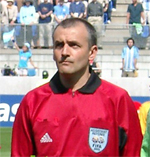An exceptional referee or assistant who cannot rely on national colleagues at the level to form these famous trios is therefore without an international future today! It’s a bit like insisting that a goalkeeper must have a line of international defenders to be selected. Madness! Those who remember the Euro 2000 semi-final between France and Portugal, and the victory of the Blues by a golden goal on a penalty, do they recall that the foul leading to the winning penalty was indicated by the Slovak assistant Igor Sramka? An assistant colleague who had a brilliant international career and can thank the heavens that trio selection was not in place during his time. Because there were no top Slovak referees.
Lubos Michel made his international debut in 2002. As for Maciej Wierbowski, the Polish assistant who officiated during the 2002 World Cup semi-final Brazil vs. Turkey, his international career almost came to a halt (at 31 years old) due to the absence of Polish referees on the world stage.
FIFA Practices Selective Sorting
And it is this same rule of trios that proved fatal to Carlos Amarilla Demarqui, the experienced Paraguayan referee with nearly 300 international matches (including 2 Copa Americanas and 1 final, among others, the 2006 German World Cup…), taken down by the failure of his assistants during the last physical tests.
Just like Mohamed Benouza (Algeria) betrayed by his assessors again… Only one trio of Uruguayan officials to make up for these defections, as it seems the FIFA refereeing commission decided not to apply its policy of substitute trios.
But one could expect the strict and emotionless application of this rule because in 2006 the Spanish leaders of this commission had to, very likely with a heavy heart, eliminate the refereeing team of Manuel Mejuto Gonzalez, himself a Spanish speaker as his name indicates.


